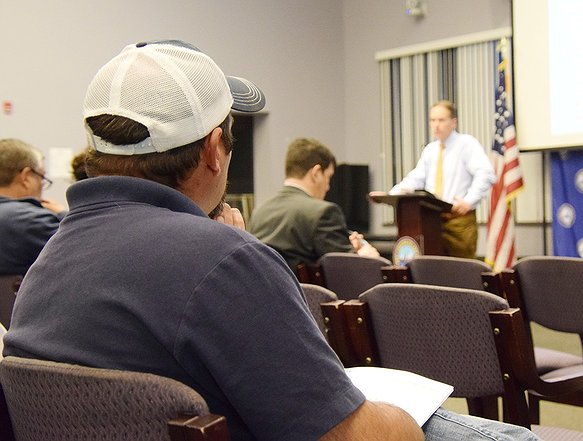P.C. isn’t alone in FD struggles
November 14, 2024 at 12:23 a.m.
The Port Chester Fire Department came under scrutiny a few months ago when it came to light that half of the 24 active officers hadn’t received the training required to hold their positions.
It sparked heated debate between members of the department and Village officials regarding how the fire prevention service should be run and who should bear the responsibility of oversight.
Next speaker series to discuss AI
The next Village Manager’s Speaker Series on Tuesday, Nov. 26 at 4 p.m. will feature Ed Eisenstein, CEO of United Network Associates, who will discuss the impacts of AI on the private and public workforce. It will be at the Port Chester Senior Community Center, 220 Grace Church St.
To help clear the air, Village Manager Stuart Rabin invited New York Conference of Mayors (NYCOM) Counsel John Mancini to address the topic at the Port Chester Senior Community Center on Oct. 29 as part of his ongoing Speaker Series.
Mancini’s discussion drew a crowd of local representatives from both parties, including Mayor Luis Marino, Trustees John Allen, Juliana Alzate and Bart Didden, as well as numerous members of the fire department.
The talk also pulled several from outside the Village who were looking to hear from Mancini, including firefighters from across Westchester and Mamaroneck Mayor Sharon Torres.
Their attendance was the first sign of Mancini’s overall message: These issues aren’t exclusive to Port Chester.
A common question the NYCOM counsel has seen from firefighters across the state is which group has final say in fire department matters.
“I’ve been doing this for a long time, and there’s probably no other area of the law that I work in where I hear, ‘Well, we’ve always done it this way,’ than when it comes to the fire service,” he said, referring to both village governments and their fire departments. “Well, there may be things wrong with them from a liability standpoint. And that can lead to significant issues.”
Mancini cited Article 10 of the New York Village Law as the general answer to who gets final say.
“A village fire department falls under the jurisdiction of the village board,” he said. “There are no independent village fire departments in the State of New York.”
It’s a rule that applies to all villages, even in places where the department is older than its charter, like Port Chester.
“The law is very clear,” Mancini said. “There should be no question about that authority.”
However, there are some ways in which fire companies can have more autonomy.
“Each incorporated fire company has control over their own bylaws,” Mancini said. “The village does not have authority over those internal bylaws.”
That point came with the caveat that they cannot conflict with village, state or federal law.
It led to Torres asking whether a village board could enact legislation to add specific requirements for members of the fire department.
“Those policies supersede any and all bylaws,” Mancini said.
It’s something the Village of Port Chester has become somewhat familiar with: On Oct. 7, the board cemented several mandates into law, including training requirements for leadership positions. To many firefighters, it was a controversial measure.
Mancini said his office has been fielding calls from fire chiefs and mayors alike asking about who is in the right when it comes to control. But he believes a balance can, and should, be found.
“I’ve even gotten calls from both sides asking if a fire department can secede from a village,” he said. “The answer to that is no, a village fire department cannot unilaterally secede, but we have been getting that question more often.”
He emphasized that the two bodies should work together to reduce animosity because there may be struggles on the horizon.
“One of the issues that has been consuming a lot of my time over the past year are the proposed OSHA (Occupational Safety and Health Administration) regulations,” Mancini said, referring to the Emergency Response Standard (ERS) that was presented in February.
Those changes, labelled “Pain Points” in Mancini’s presentation, would include drastically increasing the amount of training required for all firefighters, calling for annual medical checks that could cost upwards of $2,000 per member and large increases in pre-incident planning.
They would be unfunded federal mandates brought down on all fire departments.
“If these regulations are adopted as presented, it would be the death knell for many volunteer fire departments and it would have a significant impact on municipal budgets as well,” Mancini said. “So, whether you’re a volunteer firefighter or you’re on a village board, you need to start planning together for it.”





Comments:
You must login to comment.